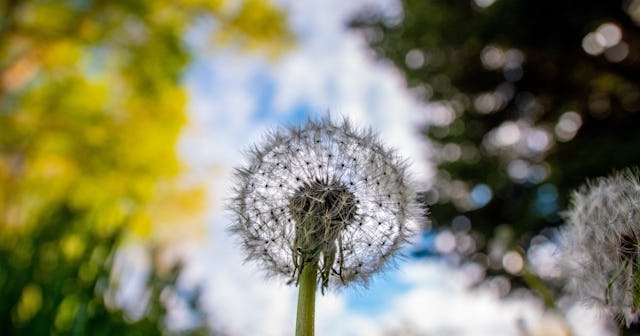How To Make DIY Weed Killer To Keep Your Yard In Shape

If you’re someone who is lucky enough to have some sort of yard — or anywhere that has the ability to grow foliage — you’ve probably had to deal with weeds. And you’re not the only one. In fact, according to the latest search data available, there are over 40,500 monthly searches for homemade weed killer, so clearly they’re not just showing up on your lawn. It seems like no matter how much you water and feed the flowers and plants you actually want to be there, they’ll never grow as well as those unwelcome weeds. Sure, you can pick the weeds through the cracks of the sidewalk and the middle of your flowerbed when they grow, but that’s time consuming. Also, they’ll just grow right back. But even though you want those pesky plants gone, you may not want to dump chemicals on them. The good news is that there’s a way around it: making your own weed killer.
What is a weed?
Actually, the term “weed” is a bit foggy. Merriam-Webster defines weed as a noun, meaning, “a plant that is not valued where it is growing and is usually of vigorous growth; especially one that tends to overgrow or choke out more desirable plants.” While your neighbor’s creeping ivy hanging over your shared privacy fence may not seem like a weed to them, it does to you. Then there are plants like Milkweeds (an umbrella term for plants in genus Asclepias), which often look like weeds and function like weeds but often serve an especially important purpose in a garden by attracting butterflies. Whatever “weed” you’re currently frustrated with, there’s a solution ahead. Here are a few options.
Salt and Vinegar (And Soap)
Not only is salt and vinegar the best potato chip flavor, it’s also an effective weed killer. The experts at HGTV have put together a recipe for a natural weed killer that you can make yourself with stuff you probably already have at home. Simply combine one gallon of white vinegar with one cup of salt, and one tablespoon of liquid dish soap. Combine everything in a spray bottle and spritz weeds at the time of the day when the weeds get the most sun. But beware: this weed killer is so good at killing plants, that it may kill the plants that you are trying to keep alive. And if too much gets directly into the soil, it could negatively impact all the plants in that flowerbed as well. To be safe, just spray it directly on the problematic weeds.
Concrete and Driveway Weed Killer
Not all weeds are created the same, so it makes sense that there are different formulations. This particular recipe is designed to kill those annoying weeds that spring up in the cracks of your driveway or sidewalk. Just add one tablespoon of salt to two quarts of boiling tap water, and pour over the weeds you want to get rid of.
Rubbing Alcohol Weed Killer
This one is very straightforward. Just put two tablespoons of rubbing alcohol and one quart of water in a spray bottle, mix it up, and spray it on those weeds.
Lemon Juice
Yes, this is a natural method for killing weeds, but it’s not necessarily the most cost effective. Basically, just take a lemon and squeeze the juice over the weeds. They should shrivel up and die within a day or two.
Cornmeal Gluten
Whether or not you realize it, you may have some weed killer in your pantry right now. Cornmeal gluten acts as an organic herbicide and is free of toxic chemicals. It prevents crabgrass, dandelions, and chickweed seeds from growing on soil.
Baking Soda
If you tried dumping boiling water and salt on your driveway weeds and it didn’t do the trick, try some baking soda next. Just grab a few handfuls and sprinkle it on the weeds. If they grow back, do it again in four to six weeks.
Plant Oils
Though we usually think of oils as being nourishing for things like our skin, using certain plant oils on weeds doesn’t have the same effect. The active ingredients of plant oils — like the eugenol in clove oil and citric acid and d-limonene in citrus fruits — are used in a number of herbicides. Plant oils work best when used on small, actively growing weed seedlings.
Borax Weed Killer
So, using borax may not be the best for the environment, but that includes your weeds. Mix one cup of powdered borax with two gallons of water and put it into a spray bottle. This solution is especially effective on “creeping Charlie” and “ground Ivy.” As a bonus: it also kills ants.
Lay Down Landscaping Fabric
Let’s say you’ve done your homework, made the most natural weed killer solution and sprayed it carefully so as to not harm other plants around it. Good on you. But weeds have a reputation for being resilient and sooner or later they’re going to rear their heads again. What can you do? Landscaping fabric might be your BFF in this scenario. Not only does the fabric help establish a base for your garden, but it also keep weeds from growing and existing weeds from taking over. A win-win!
This article was originally published on